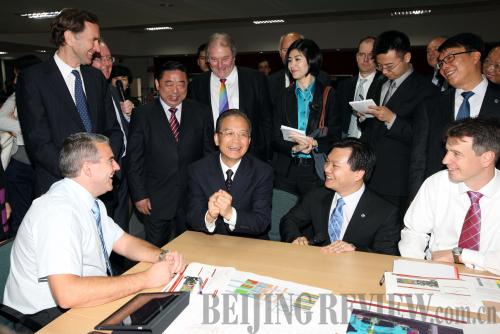|
 |
|
DRIVER'S SEAT: Chinese Premier Wen Jiabao talks with technicians at MG Motor, a subsidiary of China's Shanghai Automotive Industry Corp., in Birmingham, Britain, on June 26 (YAO DAWEI) |
Chinese Premier Wen Jiabao's recent European tour injected confidence into the EU as it battles a debt crisis that began 18 months ago, Chinese analysts said.
"The sovereign debt crisis continues to escalate in the EU," said Li Weiwei, Deputy Director of the Department for EU Studies of the China Institute of International Studies (CIIS). "Take Greece for instance. If the crisis goes on, the country may be forced to declare bankruptcy and withdraw from the euro zone. If a domino effect occurs, the EU will face even greater problems. Against this backdrop, Wen's visit demonstrated China's confidence about the future of the EU economy."
On June 24-28, Wen paid a visit to Hungary, Britain and Germany. With Wen was a delegation of senior officials, including Foreign Minister Yang Jiechi, Chairman of the National Development and Reform Commission Zhang Ping, Minister of Commerce Chen Deming and Governor of the People's Bank of China Zhou Xiaochuan.
Chinese support
"China signed a series of procurement contracts with the three countries during Wen's visit and will purchase Hungarian government bonds. These are concrete moves showing China's support to the EU," Li said.
China was ready to buy Hungarian government bonds and provide a 1-billion-euro ($1.4 billion) loan to the country, said Wen in Budapest, capital of Hungary, on June 25.
Following that, trade deals worth $4.3 billion, including a $2.46-billion agreement on building a clean coal plant between the China Energy Conservation and Environmental Protection Group and Britain's Seamwell International Ltd., were signed during Wen's visit to Britain.
European bonds are not the best choice as an investment product, said Sun Lijian, Vice Dean of the School of Economics at Fudan University in Shanghai.
The continuous escalation of the EU sovereign debt crisis proved it would not be easy for debt-ridden EU countries to escape the impact of the global financial crisis and achieve an economic recovery in a short time, Sun told International Finance News.
Central and Eastern European countries, with Hungary as a representative, had long suffered from a weak economic foundation and an overdependence on developed West European countries. In light of this, the Chinese Government's decision to purchase more European bonds does not intend to reap profitable returns, but to provide financial support to these countries, Sun said.
Wen had a positive attitude toward purchasing European government bonds because China aims to promote the diversification of its reserve assets, said Mei Xinyu, an associate research fellow with the Chinese Academy of International Trade and Economic Cooperation.
In order to diversify its huge reserve assets, China has to adopt a long-term strategy, Mei said. Purchasing European bonds now not only is cost-effective, but also can help gain larger market access for Chinese direct investment in Europe.
China's purchase of euro bonds contributed to the stability of the euro and the recovery of the European economy, Mei said. But greater efforts are still needed to achieve "win-win results."
For instance, China needs to increase its direct investment in Europe. Europe needs to expand market access for Chinese goods and investment and push forward its own labor market reform.
"A rigid labor market protection system will only inhibit investors' willingness to invest, and reduce the growth potential of Europe's employment opportunities," Mei said.
| 